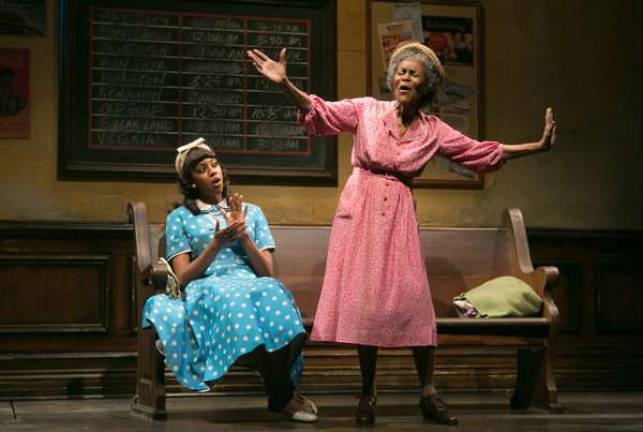Recall and Response

Cicely Tyson brings realness to The Trip to Bountiful
Broadway's new Black (or non-traditional cast) production of The Trip to Bountiful comes alive when Cicely Tyson as Carrie Watts, an elderly Texas widow longing to return to her titular hometown, stands up and sings a church hymn in a desolate bus station. It is the chestnut "Blessed Assurance" and as Tyson prances and sings, the audience spontaneously joined in.
Was it a response to the actress and her legacy of cultural landmarks (Sounder, Roots, The Autobiography of Miss Jane Pittman, East Side/West Side) or gospel's call-and-response tradition that veteran Black performers and audiences bring to Broadway? It was a surprising-and unexpectedly satisfying-moment; unscripted by playwright Horton Foote whose synthetic Southern doggerel treats the human condition like bolts of preprinted fabric. Familiar ideas about family, aging and the passing of time are cut and stitched into ready-made, second-hand drama-the half-tragic equivalent to a sitcom.
But there's Tyson as Carrie Watts, the role that originated by Lillian Gish and that won Geraldine Page an Oscar. This occasion forces one to realize the paucity of roles for older actresses (Tyson is 80), especially black actresses. Tyson seizes the vehicle to communicate her principled talent to a culture that has forgotten what that means.
When Carrie cries "I want to go back to Bountiful," Tyson gives it the yearning of a woman who feels existentially stranded in a debilitating, non-nurturing place, a cramped two-room Houston apartment with her son Ludie (Cuba Gooding, Jr.) and his frustrated, harpy wife Jessie Mae (Vanessa Williams). The situation parallels the lack of mobility faced by black actresses toiling in an unwelcoming or restricting profession.
Tyson's career milestones have always happened against the odds yet her successes are impressive because their always demonstrate moral integrity. Not the worse legacy, it puts Tyson in the same league as Paul Robeson, Ethel Waters, Lena Horne, Harry Belafonte?powerful performers who also stood for something. In this case, the memory of a bountiful artistic and political calling in which personal artistry illuminates mere professionalism.
That Tyson's lack of sentimentality-her defining quality-fits Carrie Watts is ironic. Foote's determined yet nostalgic crone is utterly average, suffering typical old-age dilemmas. Not exactly a warm matriarch, Tyson makes her stubborn, self-obsessed drive to return to her roots seem vital, (her subtle anger recalls Tyson's Rebecca in Sounder). She works Foote's threadbare, pseudo-homey clichés for all they're worth.
There's no richness in Foote's writing, the flat, naturalistic language resists poetry; Geraldine Page gave the film her hammy but great emotionalism to stave off Foote's unintended yet unavoidable bleakness. In the last act, director Michael Wilson lets Tyson nearly transform Carrie Watt's dotage into principle: "I found my dignity and strength" she says looking at her girlhood home with the symbolic name, (a bland version of the yearning psychology William Inge expressed better in Come Back, Little Sheba).
That line isn't quite believable but we know what Carrie/Tyson means: The search for stronger values and desire to restore personal heritage are clear. The sympathetic audience provided a Tyler Perry response, giving more implicit Christian fellowship than Foote intended. (Singing "Blessed Assurance" also recalls Tyson's very excellent Peter Bogdanovich TV movie Blessed Assurance.) With Tyson's presence, this production's new ethnic focus evokes the Great Migration history of blacks relocated to urban living yet retaining ambivalent memories of the South as home. Jeff Cowie's set, superlatively lighted by Rui Rita, recalls the Hudson River School of bucolic radiance; creating a visible, nearly cinematic passage of time.
The years since Tyson performed in the legendary 1961 production of Genet's The Blacks have seen the once-thriving Black American theater movement pass. In this not-good-enough play Tyson's richness and will makes one nostalgic for Black theater's forgotten bounty.
Follow Armond White on Twitter at 3xchair